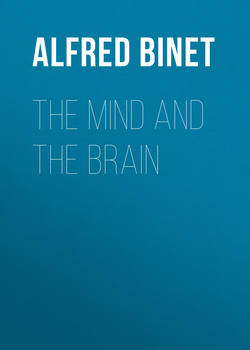The Mind and the Brain

Реклама. ООО «ЛитРес», ИНН: 7719571260.
Оглавление
Alfred Binet. The Mind and the Brain
BOOK I
CHAPTER I. INTRODUCTION
CHAPTER II. OUR KNOWLEDGE OF EXTERNAL OBJECTS IS ONLY SENSATIONS
CHAPTER III. THE MECHANICAL THEORIES OF MATTER ARE ONLY SYMBOLS
CHAPTER IV. ANSWERS TO SOME OBJECTIONS, AND SUMMARY
BOOK II
CHAPTER I. THE DISTINCTION BETWEEN COGNITION13 AND ITS OBJECT
CHAPTER II. DEFINITION OF SENSATION
CHAPTER III. DEFINITION OF THE IMAGE
CHAPTER IV. DEFINITION OF THE EMOTIONS
CHAPTER V. DEFINITION OF THE CONSCIOUSNESS—THE RELATION SUBJECT-OBJECT
CHAPTER VI. DEFINITION OF THE CONSCIOUSNESS—CATEGORIES OF THE UNDERSTANDING
CHAPTER VII. DEFINITION OF THE CONSCIOUSNESS—THE SEPARABILITY OF THE CONSCIOUSNESS FROM ITS OBJECT—DISCUSSION OF IDEALISM
CHAPTER VIII. DEFINITION OF THE CONSCIOUSNESS—THE SEPARATION OF THE CONSCIOUSNESS FROM ITS OBJECT—THE UNCONSCIOUS
CHAPTER IX. DEFINITIONS OF PSYCHOLOGY
BOOK III
CHAPTER I. THE MIND HAS AN INCOMPLETE LIFE
CHAPTER II. SPIRITUALISM43 AND IDEALISM
CHAPTER III. MATERIALISM AND PARALLELISM
CHAPTER IV. MODERN THEORIES
CHAPTER V. CONCLUSION
CHAPTER VI. RECAPITULATION
Отрывок из книги
This book is a prolonged effort to establish a distinction between what is called mind and what is called matter. Nothing is more simple than to realise this distinction when you do not go deeply into it; nothing is more difficult when you analyse it a little. At first sight, it seems impossible to confuse things so far apart as a thought and a block of stone; but on reflection this great contrast vanishes, and other differences have to be sought which are less apparent and of which one has not hitherto dreamed.
First let us say how the question presents itself to us. The fact which we must take as a starting point, for it is independent of every kind of theory, is that there exists something which is "knowable." Not only science, but ordinary life and our everyday conversation, imply that there are things that we know. It is with regard to these things that we have to ask ourselves if some belong to what we call the mind and others to what we call matter.
.....
And, in fact, let us remember what it is that we have argued upon—viz. on an observation. I look at my hand, and I see an object approaching it which gives me a sensation of feeling. I at first say that this object is an excitant. It is pointed out to me that I am in error. This object, which appears to me outside my nervous system, is composed, I am told, of sensations. Be it so, I have the right to answer; but if all that I perceive is sensation, my nervous system itself is a sensation; if it is only that, it is no longer an intermediary between the excitant and myself, and it is the fact that we perceive things as they are. For it to be possible to prove that I perceive, not the object, but that tertium quid which is sensation, it has to be admitted that the nervous system is a reality external to sensation and that objects which assume, in relation to it, the rôle of excitants and of which we perceive the existence, are likewise realities external to sensation.
This is what is demonstrated by abstract reasoning, and this reasoning is further supported by a common-sense argument. The outer world cannot be summarised in a few nervous systems suspended like spiders in empty space. The existence of a nervous system implies that of a body in which it is lodged. This body must have complicated organs; its limbs presuppose the soil on which the animal rests, its lungs the existence of oxygen vivifying its blood, its digestive tube, aliments which it digests and assimilates to its substance, and so on. We may indeed admit that this outer world is not, in itself, exactly as we perceive it; but we are compelled to recognise that it exists by the same right as the nervous system, in order to put it in its proper place.
.....